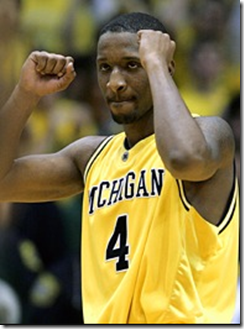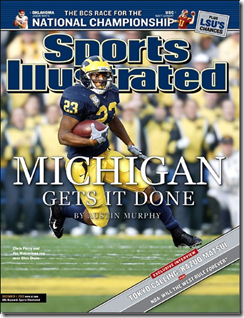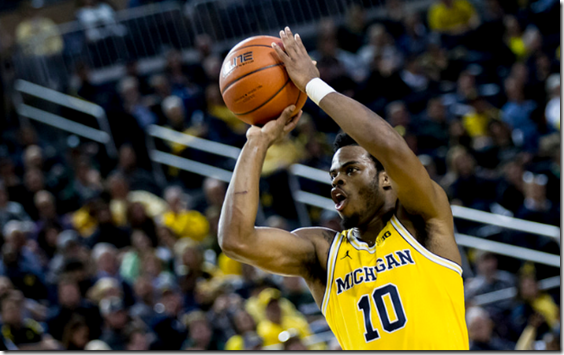Suddenly it’s happening [Marc-Gregor Campredon]
The Question:
Ace:
Best/favorite/memorable senior-year breakout?
Brian: I surmise this is in honor of Derrick Walton?
Ace: Indeed.
Brian: We should point out that Walton's breakout is not merely a senior year breakout but the ultra-rare midseason senior-year breakout. After being called softbatch.
Ace: Yeah, I don’t really remember anything quite like what Walton has done over the last month, at least with Michigan basketball players.
Brian: I could kiss Maverick Morgan.
---------------------------------
The Responses:
Ace: The senior-year breakout that comes to mind for me hopefully won’t have too many parallels to Walton. When I was a senior in high school, my parents got me a ten-game ticket package for Michigan basketball that covered the conference portion of the schedule. This was 2005-06, when it looked like this could finally be the year that Tommy Amaker’s squad snapped the tourney drought.
 |
Senior Horton nearly got an Amaker team to the Dance. [MGoBlue.com via Holdin the Rope] |
Up to that point in his career, Daniel Horton had been an enigmatic player: obviously talented, usually the best player on some mediocre teams, but clearly hamstrung by the system and surrounding talent. His ORating never cracked 100 in his first three years at Michigan, and after a junior season cut short when he pled guilty to domestic violence, it looked like his promising freshman year may stand as his peak.
It all clicked in his senior year. Horton took a Walton-esque leap with his finishing around the rim, hit 39% of his threes, and played remarkably efficient ball for someone shouldering such a huge load (111.4 ORtg on a 28% usage rage). He had several notable performances, most of which came down the stretch: 32 points in a win at Minnesota, 23 and five assists in a win over MSU at Crisler, 21 and five in the home rematch against the Gophers, and a masterful 39-point game to beat Illinois and get Michigan to 8-6 in the Big Ten and on the precipice of a tourney bid. (Someone, please, get that game on YouTube. That was as loud as I’d ever heard Crisler until the Final Four squad.)
Horton’s heroics weren’t quite enough to propel Michigan into the tournament. The Wolverines went 2-7 down the stretch, with Dion Harris’ ankle injury against Ohio State wiping out much of Horton’s scoring support; Horton’s 34-point game against Indiana still wasn’t enough to get M the final win they would’ve needed to get a bid. They instead had to settle for a run to the NIT final. Horton’s magnificent play to close out his career, however, remains one of my fondest memories from a relatively dreadful era in Michigan hoops.
[Hit THE JUMP for Seth just rocketing off answers before anybody else can]
Seth: This was part DerrickWaltonian Mid-Senior Renaissance and #Harbaugheffect, but Jake Rudock went from meh Iowa starter who could be replaced by a meh Iowa starter with an angrier dad, to interim starter who puts a hard cap on the transition season, to eviscerating Florida's secondary and an NFL draft pick.
Adam: Jeremy Clark's injury (and the NCAA's puzzling decision not permit him to play a sixth year) was unfortunate, but it ended up being papered over by Channing Stribling's excellent senior season. He went from a question mark to a guy who was splitting snaps to a second-team All-Big Ten honoree whose cumulative PFF grade was just a couple points below that of Jourdan Lewis.
 |
Does not read MGoBlog |
Seth: Is someone going to bring up Chris Perry? He had some long carries as the backup to A-Train but once he was the man CP23 was mostly disappointing. This was my Junior and Senior year on The Daily and rarely a game went by when there wasn't an argument on the staff over whether Perry or the OL was to blame for Michigan always struggling to run the ball. His vision in 2001 and 2002 was especially frustrating given the mostly power and draw running game that narrowed his choices to one or two gaps. The more damning evidence against him was that his coaches kept trying to find somebody else. The fans clamored for 5-star Kelly Baraka. The coaches seems to prefer Tim Bracken at one point. What we got, when he was healthy, was BJ Askew.
So of course in 2003 Perry is suddenly the Doak Walker winner, a Heisman candidate, and a blunt instrument with which to pound Michigan State reatedly. It didn't come out of nowhere, but this is still literally the only running back I can ever think of who improved dramatically as an upperclassman.
David: In 2002, Perry had a very nice junior season. He rushed for 1110 yards at 4.2/carry, and 14 TDs. He also caught 14 balls for 156 yards. But I agree in 2003, Perry took it multiple notches higher. Since I was already writing this up I’ll add some stats: 1674 yards, averaging 5.0/carry—up a full yard from 2002—and 18 touchdowns. He also added 44 catches for 367 yards and a couple more scores. And like everybody else he had a stellar Ohio State game that year.
Brian: Yo this has got to be Bennie Joppru. Joppru went from a bit player--seventeen catches as a junior, five of them in that awful Tennessee Citrus Bowl that everyone stopped watching in the second quarter--to Aughts Jake Butt. His 53-catch season still stands as the most in Michigan tight end history, and my memory of him is catching seams with one hand as he bats away a linebacker with the other.
BONUS: Joppru doubled down on his senior breakout by getting drafted in the second round and then immediately and repeatedly tearing his ACL. Only the good die young.
Also I have to put in a shout for the other out-of-nowhere TE in recent Michigan history: AJ Williams. Didn't have the stats like Joppru did but the transformation was nonetheless astounding.
David: David Rohlfs. Through his first three seasons (03-04 to 05-06), his point breakdowns were: 7, 6, 13; 5, 5, 10; and 2, 10, 12. That's 35 points for his career. Then came the actual definition of Senior Season Breakout. David Rohlfs tallied 17 goals and 17 assists for a total of 34 points. He just about doubled his career production in one season. A career 4th liner, Rohlfs moving up to skate with Mighty Mite TJ Hensick and Hobey Baker-to be Kevin Porter probably had a little to do with his opportunities...but David certainly took advantage of them. He also led the team with a +33. Rohlfs dabbled in minor league hockey for a few years after graduating in 2007 before putting his Business Degree to use and getting involved in local real estate.
Ace: I’ll throw in a mention for David Harris, who took a couple years to bounce back from a freshman-year knee injury and didn’t start full-time until his redshirt junior year, in which he was good but unspectacular and didn’t merit all-conference honors. I don’t remember many people predicting he’d be the All-American centerpiece of one of the best Michigan defenses of all time.
Seth: I have some old copies of The Wolverine's season preview where the coaches were bemoaning his injury setbacks. The morning after the big national blackout I was in my car listening to WTKA because that was the only way to get air conditioning in the Eastern United States, and the coaches were raving about Harris, and said he was expected to start. That would be beginning of fall practice, 2003, i.e. his redshirt freshman year.
(They also mentioned people should get in on that Google IPO that morning.)
Also one of us old guys ought to mention Brian Griese. His setbacks were kind of personal, and I bet a more modern look at his career might smooth out this trajectory. But that trajectory took him from Dreisbach's backup to John Elway's national-championship-winning heir apparent in the span of 400 days.
Ace: Made tremendous strides in hitting the right window over that span.
I’ll see myself out.
BiSB: I suppose that's a big deal if you're keeping score of such things
Seth: Are we done here? I'm still thinking of them. Ryan Mundy's weird renaissance at West Virginia that only got more inexplicable given later events. Stevie Brown found his calling as a 3-3-5 Spur and had an NFL career as a box safety.
Ace:

Now I’m done.
